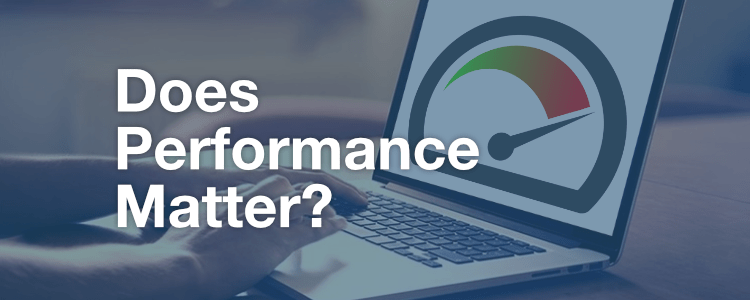Does web performance really matter?

Have you ever wondered if web performance is important, and if so why? What if your website is slow, what does it mean to you and your business? And conversely, what benefits does a fast website bring?
Slow websites, and the negative impact
Whether you run an e-commerce solution or an internal business or team website, if the site is slow you will ultimately have higher bounce rates, and lower adoption and conversion rates. But what does this all mean to you and your website?
Well, that depends on what your website does, but below are four typical examples:
- For an e-commerce solution, that means lower conversion rates and lost sales.
- For external business sites, it means a lost opportunity that’s gone to your competitor.
- For media and news websites, it means fewer page impressions and lower advertising revenue.
- For internal business websites such as SharePoint, you will get lower adoption rates and usage, which tends to lead to multiple tools getting used – this is especially true when you have some less than enthusiastic team members!
So in short, YES, web performance does matter a lot!
In today’s world of the internet, your audience’s expectations are higher than ever – users expect rich UI and UX experiences with clear images and user interaction, all within a 2-3 second time frame of visiting your website. Add mobile users into the mix, connecting over 3G or 4G, and you have a challenge in delivering on both these fronts.
Fast websites reap the rewards
Web performance is about delivering the requested web page and making it interactive for the end-user in the fastest time possible. Depending on your website type, you will have a goal for the user who’s on your website. For e-commerce, that goal is generally, to get someone to buy a product, while a news outlet’s goal may be to boost advertising revenue by increasing the number of page impressions.
But how does a well-performing website help reap these rewards?
Decreased bounce rates and retaining existing users
Getting new users to your website is great, but converting them to repeat visitors can be a challenge. If your website is slow, you can expect a higher bounce rate and a drop in repeat visitors.
First, let’s talk about bounce rates:
Bounce rates
High bounce rates reflect a user finding and visiting a single page of your website, then abandoning their session without viewing any more pages. Slow websites tend to have higher bounce rates, but remember that your website design, experience and content, will also be contributory factors.
A good example would be a news media website with too many adverts, advertising overlays and auto-starting videos. Overlays and auto-start videos always result in me abandoning my session, most of which result in me going to a competitor.
Car manufacturer websites are some of the worst offenders here – as a test while writing this blog I visited several car manufacturers and in most cases, my screen displays some form of popup or overlay survey request. I’m not picking on Renault here – there are plenty of other manufacturers doing this – but the screenshot below is a typical example where I hit the homepage and after waiting over 24 seconds for the page to load I was hit with a survey request.
Yes, data is king, but there is a time and a place to collect it. At this point, I’m not interested in answering questions; I want to look at the latest cars and the various build options available (sorry, rant over!).
Repeat visitors
Repeat visitors are important – you want to entice them back to your website, and read through your sticky content or build up and purchase a nice shopping basket. As per high bounce rates, poorly performing websites tend to have lower repeat visitor numbers, but it can also be a reflection on your website UX, content or, for e-commerce solutions, maybe just your pricing.
The moral here is to check your bounce rates and repeat visitor stats and if they are out of the industry norm then do ask yourself, your teams and customers, why? If you’re confident in your website’s UX and content etc., then do check your page performance and compare it to your competitors and other online leaders such as Amazon.
Hopefully, the above points make sense (if not, post a comment or contact me).
So what evidence exists proving that slow web performance can impact bounce rates and repeat visitors?
One good example is Pinterest, who in 2015 ran a hacked experiment that improved the mobile home landing page performance by 60% which, in return, increased mobile signup conversion rate by 40%. The test results spurred the engineering team on to rebuild their web pages for performance, and the final results speak for themselves:
- 40% decrease in Pinner wait time, the time for someone to pin an item to their list (I learn something every day!).
- 15% increase in signup conversion rate.
- 15% increase in SEO traffic (a nice by-product bonus!).
If you need convincing further, read the BBC article from 2016, “How long will you wait for a shopping website to load?” and their internal findings in “How the BBC builds websites that scale.”
Improved conversion rates
What actually is a conversion. Well, depending upon the purpose of your website, your conversion goals will vary. For example, an e-commerce site conversion is making the sale, whereas on a website offering appointments and bookings, a conversion is getting that confirmed booking.
Ultimately, these all have a value to your business, and will ultimately impact your revenue.
Countless studies and articles detailing how web performance impacts your conversion rate already exist. Also Google is a big advocate on driving the “speed matters” and “mobile first” messages, which means that a slow, non-mobile first website will be SEO penalised and ranked lower.
Online tools exist that will work out your conversion rate, and the impact of a performance change in your website. For mobile users, we can recommend “Compare your Mobile Site Speed” by Google, or Sharpe Digital’s “Speed Conversion Rate Tool”.
Either of these tools will show you how a positive or negative impact of your website performance will impact your conversion rate. The below screenshot is from Google’s tool and shows a 0.8-second decrease in page load times could potentially unlock $175k in revenue.
Upon working out your conversion rate, you can then make a call on further platform investment and getting additional staff to improve your website performance. Sometimes it’s a no-brainer.
Improved user experience
You may have one of the best looking and most functional sites in the world, but until content appears on the end-users web browser, there is no user experience. And the longer it takes for the requested web page to display content and become interactive, the worse that user experience is. A slow page will, therefore, lead to increased end-user dissatisfaction, and ultimately, increase bounce rates and fewer repeat visitors. All of these will impact your conversion rates too.
Yes - web performance does matter!
If you want to have a successful website, then yes, web performance matters. And it is not limited to e-commerce solutions - web performance impacts all online solutions, from reducing bounce rates, encouraging adoption via repeat visitors, to lending a helping hand with your SEO. Hopefully this blog has given some ideas and direction, and if you are struggling for budget look at your conversion rates and use a conversion calculator such as Google’s “think” campaign.
If any of the ideas here interest you, or you’d like to know more about website performance, why not talk to the team at Application Performance, we have a wealth of experience and advice. We’ve worked with some leading retailers and businesses, and we can help advise you further. Please just add a comment, or if you prefer, contact us here and we can get in touch.

